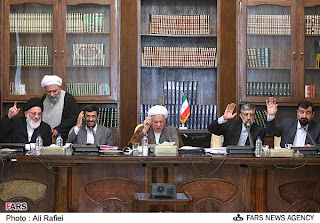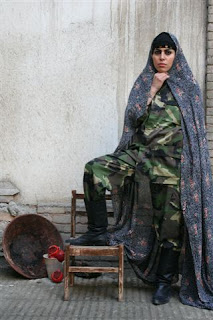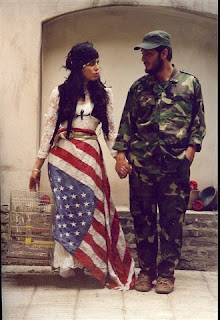This blog is about fairness; about looking at objects from multiple perspectives. Stable transformation comes only slowly; and only if the environment is free of sporadic jitters of passion and anger that destabilize growth. I strongly believe that the path to peace crosses through the battle with self.
Sunday, April 27, 2008
Friday, April 25, 2008
Action Call

Read Gareth Porter's new analysis
Cheney aggressively solicited political support from Turkish leaders for a U.S. strike against Iranian nuclear facilities during his visit to Turkey last month, according to a source familiar with Cheney’s meeting in Ankara.
Cheney was “very aggressive” in asking Turkish Prime Minister Recep Tayyip Erdogan and President Abdullah Gul, as well as Turkey’s chief of general staff Gen. Yasar Bukyukanit to get “on board” with such an attack, according to the source, who has access to reports from the Cheney visit.
Cheney indicated that Turkey had been added to the trip at the last minute, suggesting that the decision to visit Ankara was linked to the Fallon resignation.
Wednesday, April 23, 2008
Hillary Clinton promises to "obliterate" Iran
And at the end of the day, people who are voting for her are either senile, or battered women with serious phallic envy disorder who seek empowerment in obnoxious talk-tough attitude of this utterly stupid woman: Hillary Clinton!
This is her new cat out of the bag:
WASHINGTON (Reuters) - Democratic presidential candidate Hillary Clinton warned Tehran on Tuesday that if she were president, the United States could "totally obliterate" Iran in retaliation for a nuclear strike against Israel.
On the day of a crucial vote in her nomination battle against fellow Democrat Barack Obama, the New York senator said she wanted to make clear to Tehran what she was prepared to do as president in hopes that this warning would deter any Iranian nuclear attack against the Jewish state.
"I want the Iranians to know that if I'm the president, we will attack Iran (if it attacks Israel)," Clinton said in an interview on ABC's "Good Morning America."
"In the next 10 years, during which they might foolishly consider launching an attack on Israel, we would be able to totally obliterate them," she said.
"That's a terrible thing to say but those people who run Iran need to understand that because that perhaps will deter them from doing something that would be reckless, foolish and tragic," Clinton said.
Her comments appeared harder than a week ago, when during a presidential debate she promised "massive retaliation" against any Iranian attack on Israel.
Obama rejected Clinton's rhetoric as saber rattling on a day when Pennsyhttp://www.blogger.com/img/gl.link.giflvania Democrats voted in a party primary contest that could help decide which Democrat will face Republican John McCain for the White House in the November general election.
"One of the things that we've seen over the last several years is a bunch of talk using words like 'obliterate,"' Obama, an Illinois senator, said in a separate ABC interview. "It doesn't actually produce good results. And so I'm not interested in saber rattling."
WAIT A MINUTE MRS DUMB-ASS CLINTON:
Those who have been threatening IRAN with military action in recent months have been Israelis; not the other way around!
Jerusalem Post: "Military Action Against Iran Ready"
AFP: Israel may have to take military action against Iran, Bolton says
Israel Toda: "Israel receive the blessing of EU and US to attack Iran"
London Time: "Leaked, Israel plans nuclear strike against Iran"
London Telegraph: Israel seeks all clear to attack Iran
ICH: Petraeus signals attack against Iran
Saturday, April 19, 2008
Juliette Binoche en Iran

I went to Tehran twice and experienced very contradictory emotions. The first time I was amazed by how Iranian women were cultured and this appeared every time I had the opportunity to discuss with them. THEY KNOW EVERYTHING, are familiar with all kinds of music and have seen all kinds of films from all over the world. I love Persian Poets and was truly enchanted by so much culture and insight. Also I found strong similarities between Iranians and Italians: They love life, are enthusiastic, love food, speak loud and love to laugh. Also despite the fact that women are veiled, I was impressed by their degree of freedom. I wore the veil by respect for the country and naturally took it like a game for which I had to learn the rules.
Friday, April 18, 2008
Freedome of Information Act: British soldiers who were arrested last year had trespassed.
UK sailors seized by Iran were not in Iraqi waters, documents confirm
London, Apr 17, IRNA -- Fifteen British sailors and marines captured by Iran last year were not in Iraq's maritime territory as the UK government claimed, official documents released under the Freedom of Information Act confirm.

Documents released under the Freedom of Information Act detail for the first time the blunders last spring that led to what an all-party committee of MPs came to describe as a “national embarrassment”.
The captured 14 men and one woman were paraded on Iranian TV for a fortnight before being freed a year ago by a smiling President Ahmadinejad, who gave them new suits and bags of presents.
Newly released Ministry of Defence documents state that:
— The arrests took place in waters that are not internationally agreed as Iraqi;
— The coalition unilaterally designated a dividing line between Iraqi and Iranian waters in the Gulf without telling Iran where it was;
— The Iranian Revolutionary Guards’ coastal protection vessels were crossing this invisible line at a rate of three times a week; It was the British who apparently raised their weapons first before the Iranian gunboats came alongside;
— The cornered British, surrounded by heavily armed Iranians, made a hopeless last-minute radio plea for a helicopter to come back and provide air cover.
Iran always claimed that it had arrested the Britons for violating its territorial integrity.
Des Browne, the Defence Secretary, repeatedly told the Commons that the personnel were seized in Iraqi waters.
The MoD, in a televised briefing by Vice-Admiral Charles Style, the Deputy Chief of the Defence Staff, produced a map showing a line in the sea called “Iraq/Iran Territorial Water Boundary”. A location was given for the capture of the Britons inside what the chart said were “Iraq territorial waters”. But the newly released top-level internal briefing accepts that no such border exists.
The report, addressed to Air Chief Marshal Sir Jock Stirrup, the Chief of the Defence Staff, blames the incident on the absence of an agreed boundary and a failure to coordinate between Iraq, Iran and the coalition.
Under the heading “Why the incident occurred”, the report examines the history of a border that has been disputed since a treaty between the Persian and Ottoman empires in 1639.
Professor Robert Springborg, of the School of Oriental and African Studies, said yesterday that it was negligent to fail to clarify with the Iranians where the notional boundary was.
Using the Freedom of Information Act, The Times made requests about the events. The MoD released two documents, although parts are censored. One is the report to Sir Jock dated April 13, 2007, a week after the Britons returned home unharmed. It was compiled after they had been debriefed. The other is the communications log between the mother ship HMS Cornwall and the two seaboats used by the boarding party.
What they said
“There is no doubt that HMS Cornwall was operating in Iraqi waters and that the incident itself took place in Iraqi waters . . . In the early days the Iranians provided us with a set of coordinates, and asserted that was where the event took place, but when we told them the coordinates were in Iraqi waters they changed that set and found one in their own waters. I do not think that even they sustain the position that the incident took place anywhere other than in Iraqi waters”
Des Browne, Defence Secretary, House of Commons, June 16, 2007
“Since the outset of the Iraq-Iran War there has been no formal ratified TTW [territorial waters] agreement in force between Iraq and Iran . . . In the absence of any formal agreement, the coalition tactical demarcation (the Op Line) is used as a notional TTW boundary. It is a US NAVCENT [US Naval Forces Central Command] construct based on an extension of the Algiers accord demarcation line beyond the mouth of the Shatt al-Arab [waterway] into the NAG [northern Arabian Gulf]. While it may be assumed that the Iranians must be aware of some form of operational boundary, the exact coordinates to the Op Line have not been published to Iran.”
Thursday, April 17, 2008
A Communist Princess
These are the interesting excerpts of an obituary written by Mariam Firouz's sister in law. (I chop out the large self-congratulatory segments about the Qajar's Farmafarma's; as my objective of this post is to keep in mind how far back the "feminism" in Iran goes.)
A month ago this day, on March 12th, a Persian Pasionaria, referred to also as 'Red Princess', died in Tehran at age 94, testifying to the tenacity of the foremost female Communist and feminist activist of Iran. Born a princess, Mariam Firuz never wavered in the pursuit of her aim to bring modernity and the emancipation of women to Iran. Yet, apart from a sympathetic obituary with some factual flaws, by Baroness Afshar in the Guardian (March 31st) and a few articles on Persian websites, the saga and the death of this remarkable woman has gone largely unreported.
[...]
Mariam had been educated at the Jeanne d'Arc missionary school in Tehran, where the nuns were more concerned with substituting Christian keys for Moslem ones to the gates of Heaven – hardly an answer to the urgency of the political and social problems to which this precociously aware student was to devote most of her life. [...]
Her first bold step was to establish a literary salon, attended by some of the most talented Iranian minds of the time – poets, litterateurs, erudite scholars -, at least two of whom were infatuated with her combination of beauty, personality and high intellect. (One of these was Rahi Mo'ayyeri, [...] whose inimitable poetry charmed generations. [the other one was] a dashing young architect, Nureddin Kianuri, who had studied at the Beaux-Arts in Paris [... who] was the grandson of the most reactionary cleric in the early 20th century, Sheikh Fazlollah Nuri, the only high cleric who was executed publicly in 1909 for having fomented agitation against the newly established constitutional regime. [...] Kianuri [was] a Communist, as were quite a few intellectuals of his generation, he was a Stalinist and a founding member of the Tudeh, the Communist Party of Iran.
To a passionate and compassionate woman such as Mariam, the Tudeh's radical ideas, with its feminist content, had an irresistible appeal that would lead her inexorably towards activism. [...] Soon after she met Kianuri she founded the Women's chapter of the Tudeh Party in the 1940s and launched a publication to educate women on their rights and on the benefits of embracing a radical ideology that took these seriously enough. At the time, no other political or social movement would have provided such an outlet for her irrepressible energy nor such scope for her urge to emancipate women and relieve the misery of the dispossessed. [...]
There followed a few years of freedom to promote the Tudeh's ideals and militancy that attracted more and more devotees, but in 1951, political history took a new turn when Mariam's first cousin, Dr. Mossadegh, became Prime Minister in a truly democratically functioning Iran. Mossadegh's decision to launch the nationalization of oil won over the enthusiasm of a nation which had been moving in that direction for some time. The Tudeh, for its part, was hoping to turn the situation to its own advantage, but was losing ground as the nation rallied behind Mossadegh. Ultimately, though, the Tudeh must take a share of the blame for the failure of Iranian democracy, if only by giving the British the excuse of a much exaggerated Communist threat. A Godsend intended to scare away an initially sympathetic USA from backing Mossadegh. The much-told tale of how the Shah was brought back by a CIA-engineered coup to abrogate the democratic society he left behind, requires a post-scriptum in the present context.
Right after the Shah was reinstated with the blessings of a consortium of global oil giants, there was a wave of arrests, focusing particularly on the Tudeh, [...] but Mariam managed to slip through the grip of her pursuers and roamed for three years under the cover of night and a black chador. [...]
The Tudeh was well organized and had infiltrated a number of institutions, including the military at every level. Before Mariam could exhaust the range of hideouts, Kianuri and his fellow prison inmates broke loose and escaped to Iraq (where the Communist Party was on the rise), thanks to the complicity of sympathetic officers within the army. In 1956, Mariam was able to join her husband en route to Moscow. Thus began almost a quarter of a century of life in exile, away from home and the family she loved, - first in Moscow, then Leipzig and finally East Berlin where the couple enjoyed the relative luxury of a three-room apartment, a car and even a tiny garden out of town (which Mariam named "Punak" in memory of their family estate outside Tehran). They were allowed to receive visits from abroad as well as parcels. [...]
In 1979, when the monarchy was overthrown by the Islamic Revolution, [...] the ideological rift between the Communists and the Islamists was too deep to be bridged [...] When the inevitable break-up occurred, the members of the Tudeh found themselves once again in jail. Kianuri, broken by torture, eventually admitted on public television to having spied for the Soviet Union, but Mariam consistently refused to recant or admit to any treasonable acts. Her physical suffering was publicized at the time by such organizations as Amnesty International, the Human Rights Commission of the UN and PEN International, but the pain of witnessing the regression of women must have been her toughest ordeal. Nonetheless, she retained a strong morale, even after her husband, liberated from jail with visible signs of physical torture, died under house arrest.
[...] her heroic courage and steadfastness are sure to light the way for women struggling to acquire their legitimate rights. Her career as a role model may well lie ahead, beyond death and the grave.
Cheney on the warpath again!
Vice President Cheney went on right-wing talk radio yesterday with a dramatic new argument for preventing Iran from getting nuclear weapons, casting the Iranian leadership as apocalyptic zealots who yearn for a nuclear conflagration.Person of the day (deconstructing the concept of apocalypse in the new century): Sut Jhally.
Wednesday, April 9, 2008
Le Monde: Infertile in Iran
The commitment to family planning is a religious and political edict in Iran and part of a progressive initiative that has extended urbanisation, influenced healthcare and mortality rates, and educated the public on the cost of overpopulation to families and the planet. Islam does not forbid the use of contraception and no direct references to it not being permitted are found in the Qur’an. So a space has been made for the use of birth control in Muslim life.
Like birth control, infertility and its treatment comes under the auspices of Jurist rule in Iran, represented by the absolute guardianship of the Supreme Leader, Grand Ayatollah Ali Hussein Khamenei. Currently – and this may surprise people in the West – Iran has the most progressive stance toward infertility treatment and the use of the assisted reproductive technologies (ART) of any Muslim country. Read more ...
Sunday, April 6, 2008
Whom is Israel Buying Oil From? Tehran!
By: Richard Silverstein
Last month the Swiss foreign minister visited Iran and, together with President Ahmadinejad, attended the signing of a multi-billion euro contract for Iran to supply Switzerland with large amounts of natural gas over the next 25 years.
The US State Department immediately condemned the deal and said it would be investigating whether it breached the Iran Sanctions Act. Israel complained too, describing the Swiss minister's visit to Tehran as an "act unfriendly to Israel". Various Jewish groups also joined in the protests, including the World Jewish Congress.
This righteous indignation was entirely predictable but more than a little odd nevertheless. On March 30, the Swiss newspaper Sonntag retaliated with the revelation that Israel, supposedly observing an ironclad boycott of all things Iranian, has been buying Iranian oil for years.
The story is in German but Israeli journalist Shraga Elam has provided me with a translation which I'll quote from here.
"Israel imports Iranian oil on a large scale even though contacts with Iran and purchasing of its products are officially boycotted by Israel. Israel gets around the boycott by having the oil delivered via Europe. A reliable Israeli energy newsletter, EnergiaNews, reported this last week [March 18] ...
"EnergiaNews got the information about the Iran trade from sources with ties to the management of Israeli Oil Refineries Ltd ... According to EnergiaNews the Iranian oil is liked in Israel because its quality is better than other crude oils.
"The report by EnergiaNews editor Moshe Shalev states that the Iranian oil reaches various European ports, mainly in Rotterdam. It is bought by Israelis and the necessary European bill of lading and insurance papers are supplied. Then it is transported to Haifa in Israel. The importer is the Eilat-Ashkelon Pipeline Co (EAPC), which keeps its oil sources secret."
EAPC was established in 1968 as a joint Israeli-Iranian company to transport oil from Iran to Europe. After the fall of the Shah, Iran ceased to play an active role in its affairs and there are ongoing legal disputes between the two partners.
The Swiss report continued:
"It is not clear if the Iranian exporters know about Israeli purchases of their oil. At the other end, the Israeli buyers and governmental offices are well aware of where the high-grade oil comes from, although it is a blatant defiance of the boycott. The EnergiaNews article even made it through Israeli censorship, which asked only for some changes in the text. The fact that the report cleared the censors increases the credibility of the information. In the past, such reports were forbidden.
"When questioned by Sonntag, an energy expert of one of the leading Israeli papers confirmed the EnergiaNews report: Israel has been importing Iranian oil for many years. The expert stressed, however, that the purchases were made on the free market and not directly from Iran."
Sonntag quoted a spokesman for Oil Refineries Ltd as denying that his company imports and processes Iranian oil. However, Sonntag pointed to a report in Haaretz newspaper last October which said that an Israeli energy company called Paz would be refining Iranian oil and supplying it to the Palestinian Authority from the start of this year.
This begs the question: if Iran is, as Bibi Netanyahu argues, an existential threat to Israel, why does the government allow such trade? Would Israel have the US attack Iran's nuclear programme and provoke a potential region-wide conflict while it cannot seem to wean itself from high quality Iranian crude? You'd think if Israelis are cowering in fear from an Iranian bomb and the arch antisemite Ahmadinejad, they wouldn't want to trade with such an enemy.
When is a boycott not a boycott? When it's in your naked economic interest to circumvent it, apparently. But one should ask: if Israel doesn't honour its self-declared boycott of Iran, why should the rest of the world honour its boycott of Hamas and Gaza? If Israel doesn't honour its own boycott, then why should members of Congress vote with AIPAC when it proposes a measure that even Israel honours only in the breach?
It's interesting to note from a discussion (in Hebrew) on the Kedma website that Israel does not formally define Iran as an "enemy nation" and therefore in a strictly legal sense such trade is permissible. Ironically, Iran too has a boycott against Israel in place and is violating its own measures in that regard. Furthermore, the same commenter notes that Israel last week dismissed attempts to engage Syria in a diplomatic process as a failure because Syria refuses to renounce its ties with Iran. Do I hear the word "hypocrisy"?
Saturday, April 5, 2008
Al-Zawahiri disambiguates McCain: Al-Quaeda is Iran's Enemy
In an internet interview, Zawahiri says it would be "in the interest" of Al-Qaeda to see Iran "sap[ped]" by a fight with the United States. Moreover, he seems to promise that the extremist collective will "battle" whoever wins that U.S.-Iran struggle.
The dispute between America and Iran is a real dispute based on the struggle over areas of influence, and the possibility of America striking Iran is a real possibility. As for what might happen in the region, I can only say that major changes will occur in the region, and the situation will be in the interest of the Mujahideen if the war saps both of them. If, however, one of them emerges victorious, its influence will intensify and fierce battles will begin between it and the Mujahideen, except that the Jihadi awakening currently under way and the degeneration state of affairs of the invaders in Afghanistan and Iraq will make it impossible for Iran or America to become the sole decision-maker in the region. (emphasis mine; translation courtesy of IntelCenter)Read Wired for more.
Also reas CSM's take on Al-Quaeda's new target.
(Have I mentioned before that Al-Quaeda is Cheney's child? Don't you see an interesting coincidence in Cheney's ME visit and this new Al-Quaeda blabber?)
Wondering what makes me think Al-Quaeda is a neo-con entity?
Turn the clock back a few years:
Axis of Adventure: Nigel Richardson in Iran
There are countries in the world that we know only through the prejudice of others; countries that we are encouraged to avoid. In a new series, Telegraph.UK writers will be visiting three of them. First Nigel Richardson learns the truth about Iran.
The flight landed at Tehran early in the morning. Those first few hours were fluidly dream-like, setting the tone for the rest of the trip. I slid through immigration with a stamp for my passport and a smile for me, then Mr Sassan - my fixer, minder and joker on this 10-day journey through Iran - scooped me up and tore me around his sprawling, honking, snow-bound capital. read the rest ...



